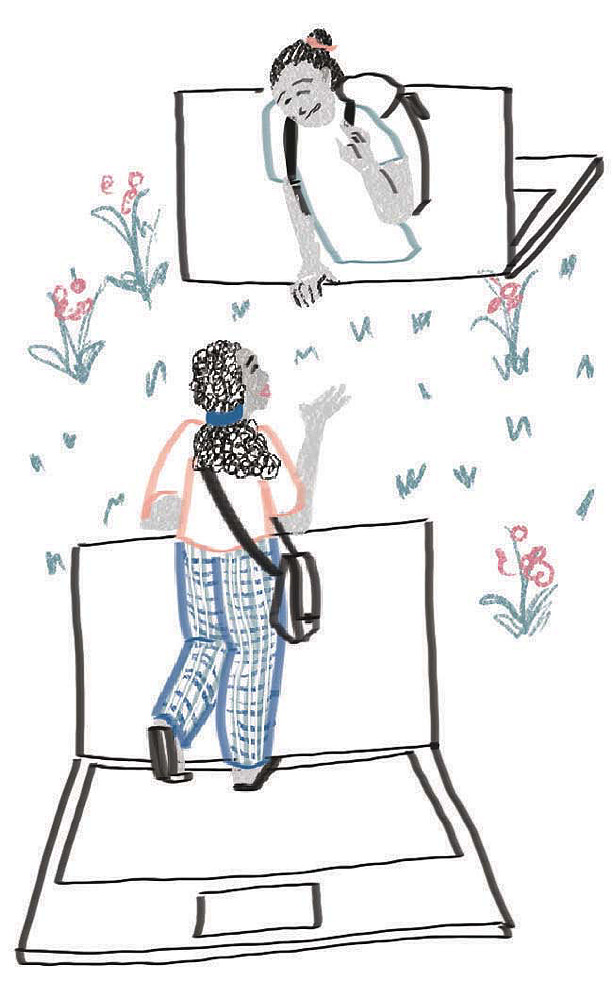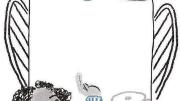A New Harvard Experience
by Rebecca E.J. Cadenhead
Like many first-years, I arrived at college ready to be molded. Correspondingly, it seemed as though the University was ready to subsume me; by catering to almost every need it ensured that I stayed within its geographical sphere, facilitating my whole commitment to becoming a Harvard student. By the time I left campus a semester and a half later, I had fashioned a new identity for myself, someone I thought might call this place home. But the Harvard experience isn’t designed to let the outside in; now that I’m back, I’m not sure who I’m supposed to be.
At lunch recently, I ate with two friends I haven’t seen and barely spoken to since March 2020. Initially, it was awkward. Our ways of relating to each other were grounded in expired references. We all looked a little different, and we spent several minutes cataloging the changes in our respective faces. We eventually found points of connection, though these were mostly related to what we’d experienced in each others’ absence: we all found returning to campus to be very strange, and we all seemed deeply sad.
Most people I encounter seem to be weighted by what they’ve lived through in the past year-and-a-half. There are, of course, exceptions to this rule. Last May, I ran into an acquaintance who had been living for the previous year in exotic locales with friends, who told me that the pandemic had “actually been pretty good” for her. I merely nodded and smiled. The rest of us hold our private griefs beside each other, not quite sure what’s appropriate to share with people we don’t really know anymore.
My own mental state is difficult to parse. Each day I open a ratty Moleskine notebook and write down exactly what I’m feeling, attempting to gain some objectivity in my self-analysis. But there are aspects of my behavior that are difficult to account for. Here, I am experiencing crowds, classrooms, and new people for the first time in months, and sometimes I react well to these things, but other times I don’t. I seem to have become unknowable to myself.
I didn’t expect it to be like this. In the spring, I lived off-campus in Cambridge with friends, where we experienced a gradual reopening of public life that we thought would proceed linearly. We got vaccinated as soon as we were eligible, and began to see more and more people from school. By the end of May, we would join groups of (vaccinated) friends, though still largely outdoors. Living in this way gave us a taste of what we’d missed most about Harvard, and our desire for the school as we’d known it pre-pandemic only grew. We fantasized about what things would be like when we returned; those thoughts now seem incredibly naïve.
We now wear masks inside—except in the dining halls, where we eat right next to each other at pre-pandemic density, mouths uncovered, but with only a single HEPA filter in a corner. “The coronavirus must know not to come into the d-hall,” I joke at lunch.
“What else are they supposed to do?” A friend responds. By “they” she meant Harvard. “At what point do we stop being in lockdown?”
She has a point. The end of the pandemic, which we thought would come this summer, never materialized, and so the University seems to have decided that it’s time to shift from prevention of the virus to mitigation. Still, I’m unsure of how to approach an environment where, in practice, we pretend the pandemic exists only sometimes.
Every few days we drop off a COVID test in an empty conference room. Initially we were only tested once a week, but in light of a surge in COVID cases, the frequency has increased to three times a week. The testing regimen seems to uncover an increasing number of infected students each day. Rumors of who’s gotten sick reverberate ominously around campus. As the student body is required to be vaccinated with few exceptions, these are almost all breakthrough infections.
Recently, I woke up to an email from the University Contact Tracing Team informing me that I’d been in close contact with someone who had tested positive. I called my parents, a little lightheaded. “It was bound to happen at some point,” I remember saying. Then I got dressed and went to class—I had no symptoms, and I hadn’t been asked to quarantine.
As I’m writing this, I’m in my room in Winthrop. Beside me there’s a large pile of tissues, pain killers, and a thermometer, all shipped overnight by my mother after I found out that I’d been exposed. Above me sits a small library’s worth of books, mostly for the classes I’m taking this semester, which I’m trying to enjoy. Still, there’s something holding me back. I suspect I’ll be able to clearly articulate what it is in a year or so. Right now, I’m finding it difficult to process what I’m still experiencing.
* * *
Seeing Places, Seeing Faces
by Swathi Kella
I arrived on Harvard’s campus this year on a Saturday, a few days separated from the tumultuous Tuesday that opened my freshman year in 2019. I had initially worried that this Saturday would become another version of that first Tuesday. After all, I was a freshman when I left, and I expected to still feel like one upon my return, even eighteen months later.
And yet, I somehow felt like an alumnus rather than a student, and Harvard a memory rather than a reality. Standing on the opposite side of Mass. Ave., I could see the rectangle of my first-year dorm window in Wigglesworth House and remember the wheeze of the door that cracked (quite literally, a line running down its center) with the first breath of winter, the cozy feel of the defunct fireplace whose mantle held my course books, and the daily bustle of my four suitemates. I could almost hear “Here Comes the Sun,” which a street performer sang just outside our window every day, without fail, long after the sun had come and gone. It all felt very distant to me.
Though I was startled to feel like an alumnus, it seemed I wasn’t alone in my premature self-aging. Over lunch, a friend told me, with a jocular disposition that betrayed a bittersweet truth, that she had entered the pandemic a child and come out of it an adult. Another said that he had aged several years in the span of just 18 months. And now, all those months later—time measured in loved ones, relationships, and motivation lost—we were in the position of returning to the places we once inhabited and figuring out who we were now.
Easily, we had grown more weathered as a class. In conversation, someone observed that the once-flamboyant dispositions of some classmates now fell like gentle rain, a process they described to me as “mellowing out.” Many had seen hardship for the first time and received perspective in return.
I almost didn’t want to learn how I had changed over the course of this time. I avoided Harvard Yard for a week. All of the spots I had frequented as a first-year—the secluded nook on the third floor of Lamont Library, the wooden tables of Annenberg dining hall, the quiet rooms of the Barker Center —no longer appealed. I was grateful for the Radcliffe Quad, a new and unfamiliar space, a chance to define myself again.
If I took solace, it was in the shifting geography of Harvard Square. In my first few days back on campus, I began slowly feeling my way around Cambridge once again, the stores that had left and those that remained. Still, with all its casualties—the loss of Pamplona Café hitting especially hard—the Square remained. A man perched on a crate by Tatte improvised an upbeat ragtime to the patter of footsteps walking by. Someone else danced with a tambourine, hitting the jangling circle against the smooth palm of his hand. Outside the Smith Campus Center, a group of Cambridge dwellers huddled around a checkered table; the elderly woman at its seat moved forward a pawn, starting another game of chess.
A few days before the start of classes, I spent an evening on the Quad lawn with my roommate. We were surrounded by rustling trees, the warmth of a setting sun, and the whistle of a Frisbee cutting through air. I had forgotten my glasses, so my roommate narrated the scene.

Illustration by Angelo Dolojan
We were sitting on the terrace of Pforzheimer House when two people approached from the side and my roommate looked up. My eyes followed, and I saw the blurred features of a face which rang bells within my mind. Had I known this person? In person, or over Zoom? It was not hard to see how the precarity wrought by the pandemic bled into our social encounters.
We exchanged hellos and stilted pleasantries, both of us omitting each other’s names.
As he walked away, I glanced at my roommate. She looked pained for having witnessed our encounter. I pulled out my phone and began hastily scrolling through old class lists, hoping to match a name—and more importantly, a concrete memory—to the face which had just passed.
Before long, he was back, walking in the other direction. I braced for a reprise of our awkwardness before he stopped and said, “I am so sorry, but how do I know you?” He explained that he had been speaking with his friend, trying to remember who I was. I laughed in relief, explaining I had just undergone the same process with my own roommate.
“Was it Spanish?” I was sure it was, but he had never taken the subject in college.
“Class of 2022?” he asked. I was 2023.
We continued in our attempt to find the point of connection. Clubs. Classes. Social gatherings. We seemed to be casting a sort of failed Venn diagram which remained only as two discrete circles.
Finally, he asked whether I, as a first-year, had enrolled in a course about infectious diseases. I had, and we both celebrated the feeling of exultation that followed as the awkwardness ebbed away.
It was a refreshing change to the discomfort that used to follow encounters like these. Failure to recognize faces, once merely a personal embarrassment, now became a communal exercise. This shift was liberating. Once, acquaintances we could recognize but not quite place would have been kept at a distance, any greetings reduced to a tentative smile or an occasional wave. Now, the collective admission that we had forgotten gave us the chance to learn again.
The moment played itself over in a number of settings: dining halls, libraries, Cambridge streets. I spent three minutes with another student over a meal, brainstorming all the different ways we could have first run into one another, before our rather anticlimactic realization that we had both taken the same Zoom class just two months earlier.
Remote learning introduced another layer of amnesia that claimed a number of relationships I would have retained in a normal year. Zoom name tags were a crutch whose absence now fell in our path, and actual human beings—with all their in-person mannerisms, dress, and speech—seemed incomparable to the versions we encountered over Zoom.
Still, the dim bulb of recognition managed to break through even the prolonged stupor of virtual learning, and we were ready to grasp every wisp to go about remembering each other once again.









